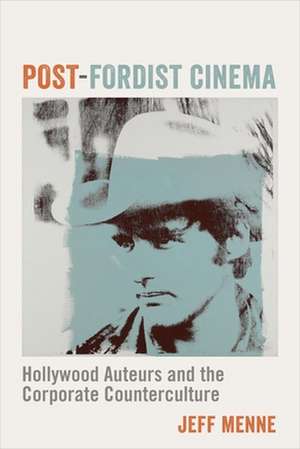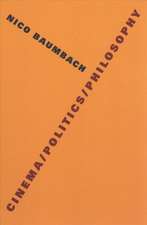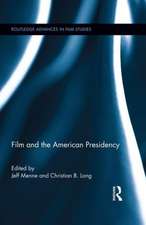Post–Fordist Cinema – Hollywood Auteurs and the Corporate Counterculture: Film and Culture Series
Autor Jeff Menneen Limba Engleză Paperback – 14 mar 2019
| Toate formatele și edițiile | Preț | Express |
|---|---|---|
| Paperback (1) | 246.40 lei 6-8 săpt. | |
| Columbia University Press – 14 mar 2019 | 246.40 lei 6-8 săpt. | |
| Hardback (1) | 604.45 lei 6-8 săpt. | |
| Columbia University Press – 14 mar 2019 | 604.45 lei 6-8 săpt. |
Din seria Film and Culture Series
-
 Preț: 229.59 lei
Preț: 229.59 lei - 8%
 Preț: 193.08 lei
Preț: 193.08 lei - 9%
 Preț: 195.25 lei
Preț: 195.25 lei -
 Preț: 225.10 lei
Preț: 225.10 lei -
 Preț: 326.77 lei
Preț: 326.77 lei -
 Preț: 217.50 lei
Preț: 217.50 lei - 23%
 Preț: 631.83 lei
Preț: 631.83 lei -
 Preț: 248.80 lei
Preț: 248.80 lei -
 Preț: 211.00 lei
Preț: 211.00 lei - 25%
 Preț: 512.30 lei
Preț: 512.30 lei -
 Preț: 184.95 lei
Preț: 184.95 lei -
 Preț: 213.74 lei
Preț: 213.74 lei -
 Preț: 204.97 lei
Preț: 204.97 lei -
 Preț: 212.00 lei
Preț: 212.00 lei -
 Preț: 267.47 lei
Preț: 267.47 lei -
 Preț: 225.37 lei
Preț: 225.37 lei -
 Preț: 224.55 lei
Preț: 224.55 lei -
 Preț: 209.37 lei
Preț: 209.37 lei -
 Preț: 209.37 lei
Preț: 209.37 lei -
 Preț: 254.89 lei
Preț: 254.89 lei -
 Preț: 262.73 lei
Preț: 262.73 lei -
 Preț: 264.64 lei
Preț: 264.64 lei -
 Preț: 261.81 lei
Preț: 261.81 lei -
 Preț: 259.53 lei
Preț: 259.53 lei -
 Preț: 292.76 lei
Preț: 292.76 lei -
 Preț: 249.24 lei
Preț: 249.24 lei -
 Preț: 246.40 lei
Preț: 246.40 lei - 23%
 Preț: 604.45 lei
Preț: 604.45 lei -
 Preț: 265.56 lei
Preț: 265.56 lei -
 Preț: 289.15 lei
Preț: 289.15 lei -
 Preț: 245.45 lei
Preț: 245.45 lei -
 Preț: 278.72 lei
Preț: 278.72 lei -
 Preț: 268.38 lei
Preț: 268.38 lei -
 Preț: 261.81 lei
Preț: 261.81 lei -
 Preț: 338.07 lei
Preț: 338.07 lei -
 Preț: 338.82 lei
Preț: 338.82 lei -
 Preț: 280.77 lei
Preț: 280.77 lei -
 Preț: 297.68 lei
Preț: 297.68 lei -
 Preț: 260.85 lei
Preț: 260.85 lei -
 Preț: 290.06 lei
Preț: 290.06 lei -
 Preț: 220.94 lei
Preț: 220.94 lei - 23%
 Preț: 604.45 lei
Preț: 604.45 lei -
 Preț: 271.43 lei
Preț: 271.43 lei - 23%
 Preț: 603.02 lei
Preț: 603.02 lei - 23%
 Preț: 635.89 lei
Preț: 635.89 lei
Preț: 246.40 lei
Nou
Puncte Express: 370
Preț estimativ în valută:
47.17€ • 49.10$ • 38.83£
47.17€ • 49.10$ • 38.83£
Carte tipărită la comandă
Livrare economică 31 ianuarie-14 februarie 25
Preluare comenzi: 021 569.72.76
Specificații
ISBN-13: 9780231183710
ISBN-10: 0231183712
Pagini: 288
Dimensiuni: 153 x 229 x 16 mm
Greutate: 0.36 kg
Editura: Columbia University Press
Seria Film and Culture Series
ISBN-10: 0231183712
Pagini: 288
Dimensiuni: 153 x 229 x 16 mm
Greutate: 0.36 kg
Editura: Columbia University Press
Seria Film and Culture Series
Notă biografică
Jeff Menne is associate professor and program director of screen studies at Oklahoma State University. He is the author of Francis Ford Coppola (2015).
Cuprins
Acknowledgments
Introduction: The Business of Auteur Theory
1: Post (Henry and John) Fordism: Kirk Douglas and Guerilla Economy
2. The Cinema of Defection: The Corporate Counterculture and Robert Altman¿s Lion¿s Gate
3. Television Totalities: Zanuck-Brown and the Privately-Held Company
4. The Ethos of Incorporation: BBS and the Law of Unnatural Persons
Afterword: Auteurs, Amateurs, Animators
Notes
Index
Introduction: The Business of Auteur Theory
1: Post (Henry and John) Fordism: Kirk Douglas and Guerilla Economy
2. The Cinema of Defection: The Corporate Counterculture and Robert Altman¿s Lion¿s Gate
3. Television Totalities: Zanuck-Brown and the Privately-Held Company
4. The Ethos of Incorporation: BBS and the Law of Unnatural Persons
Afterword: Auteurs, Amateurs, Animators
Notes
Index
Descriere
Descriere de la o altă ediție sau format:
Jeff Menne rewrites the history of the New Hollywood boom of the late 1960s and 1970s, arguing that auteur theory served to reconcile directors to Hollywood’s corporate project. Post-Fordist Cinema sheds new light on the cultural myth of the great director and the birth of the “creative economy.”
Jeff Menne rewrites the history of the New Hollywood boom of the late 1960s and 1970s, arguing that auteur theory served to reconcile directors to Hollywood’s corporate project. Post-Fordist Cinema sheds new light on the cultural myth of the great director and the birth of the “creative economy.”
















